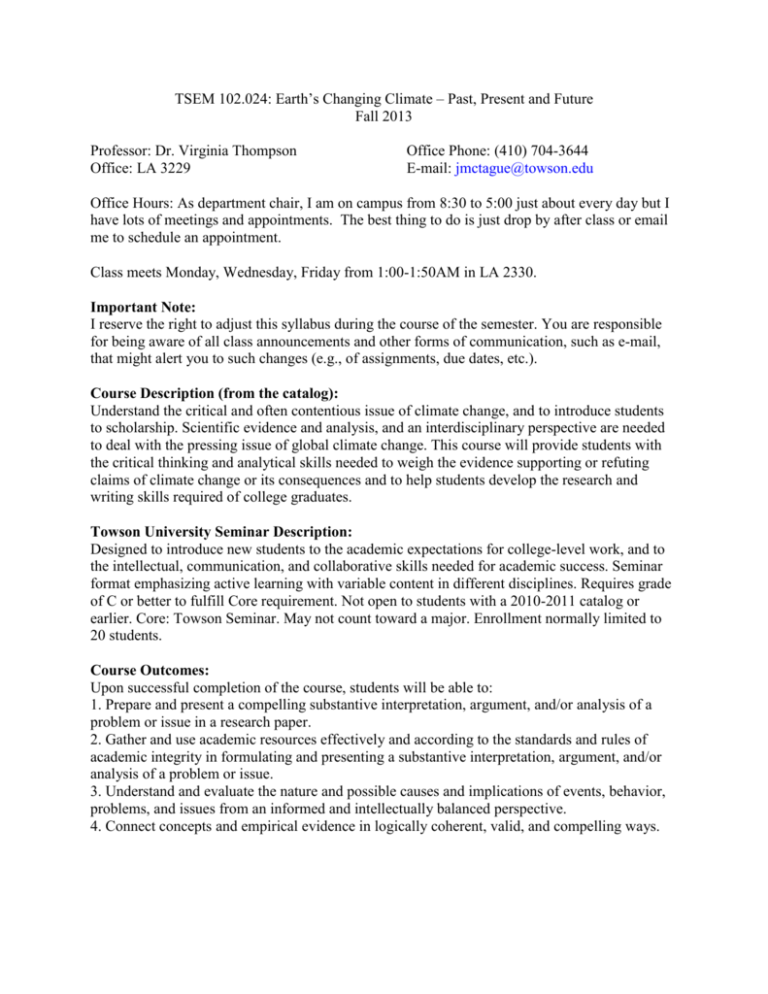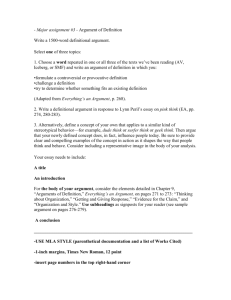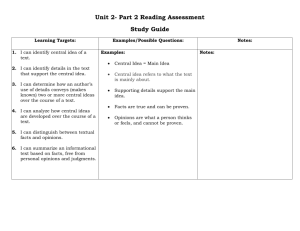SyllabusTSEM - Towson University
advertisement

TSEM 102.024: Earth’s Changing Climate – Past, Present and Future Fall 2013 Professor: Dr. Virginia Thompson Office: LA 3229 Office Phone: (410) 704-3644 E-mail: jmctague@towson.edu Office Hours: As department chair, I am on campus from 8:30 to 5:00 just about every day but I have lots of meetings and appointments. The best thing to do is just drop by after class or email me to schedule an appointment. Class meets Monday, Wednesday, Friday from 1:00-1:50AM in LA 2330. Important Note: I reserve the right to adjust this syllabus during the course of the semester. You are responsible for being aware of all class announcements and other forms of communication, such as e-mail, that might alert you to such changes (e.g., of assignments, due dates, etc.). Course Description (from the catalog): Understand the critical and often contentious issue of climate change, and to introduce students to scholarship. Scientific evidence and analysis, and an interdisciplinary perspective are needed to deal with the pressing issue of global climate change. This course will provide students with the critical thinking and analytical skills needed to weigh the evidence supporting or refuting claims of climate change or its consequences and to help students develop the research and writing skills required of college graduates. Towson University Seminar Description: Designed to introduce new students to the academic expectations for college-level work, and to the intellectual, communication, and collaborative skills needed for academic success. Seminar format emphasizing active learning with variable content in different disciplines. Requires grade of C or better to fulfill Core requirement. Not open to students with a 2010-2011 catalog or earlier. Core: Towson Seminar. May not count toward a major. Enrollment normally limited to 20 students. Course Outcomes: Upon successful completion of the course, students will be able to: 1. Prepare and present a compelling substantive interpretation, argument, and/or analysis of a problem or issue in a research paper. 2. Gather and use academic resources effectively and according to the standards and rules of academic integrity in formulating and presenting a substantive interpretation, argument, and/or analysis of a problem or issue. 3. Understand and evaluate the nature and possible causes and implications of events, behavior, problems, and issues from an informed and intellectually balanced perspective. 4. Connect concepts and empirical evidence in logically coherent, valid, and compelling ways. Course Description (Expanded): Climate change has been a constant companion for us humans. In the last decade it has become a highly contentious political issue. In this course, we will look at why the debate over climate change is so contentious. In doing so, we will discuss not just physical science, but also economics, religion, communications, psychology, sociology, and political science. Over the course of the semester, we will examine how climate change and the debate over climate change affect our culture and our lives. Each of you will have the opportunity to share your own views on these topics. It is likely that you will disagree with one another. Such disagreement lies at the heart of academic inquiry as long as it is done honestly and respectfully. Throughout the course, you will be called upon to thoughtfully reflect the attitudes and views of your peers, the text, the professor and a wide range of popular media while you shape your own attitudes towards the issues Overview of Course Requirements: A. Most of our classes will be primarily devoted to discussing the readings. I expect all students to complete all of the assigned readings by the date indicated on the syllabus, and I expect you to be prepared to discuss them. The texts will provide you with the foundation for inclass discussions as well as raw material that you can use in your research papers. B. In this class you will write two research papers that examines how the topic of climate change is handled in some form of popular media. Which popular medium you choose is up to you. It could be Cli-Fi (climate fiction), Cli-Fi movies, newspapers or news shows or another medium. Each paper should be a minimum of 1500 words. You will present your research findings to the class. C. Together, we will develop research topics in the early part of the semester, and then convert those topics into more sophisticated research projects as the semester progresses. This will be a group effort, as we will thoroughly, constructively, and collectively critique everyone else’s work during the class meetings. The goals of this collective, mutual critiquing (called “workshopping”) are several. First, it requires you to prepare a reasonably well-defined argument—enough to produce a draft of your essay that you are willing to share with others—relatively early in the semester. Second, you will get honest feedback from your peers, who will tell you how you can strengthen your argument, what kind of evidence you need to come up with to persuade them, and what works in your draft. Third, you will develop your own critical faculties as you learn to produce this kind of feedback for your peers. Fourth, you will discover the challenges of honest but useful diplomacy. Fifth, you will find yourself writing a much stronger final paper than you otherwise would have produced. Our learning in this class will be collaborative, and each of you will owe a debt of gratitude to your classmates for helping you to write a much stronger final paper than you would have been able to produce on your own. REQUIRED BOOKS: Graff, Gerald and Cathy Birkenstein. 2010. They Say, I Say: The Moves That Matter in Academic Writing, Second Edition. New York: W.W. Norton.ISBN: 978-0-393-93361-1. *** Noted in Course Outline as TSIS. Hulme, Mike. 2011. Why We Disagree About Climate Change: Understanding Controversy, Inaction and Opportunity. Cambridge: Cambridge University Press. ISBN: 978-0-521-72732-7. LIBRARY LIAISON The Cook Library Liaison for this course is Ms. Sara Nixon. She will host our class for three library sessions. She is also happy to help you throughout the semester as you are working on your research projects. Contact Information: Sara Nixon Website: http://pages.towson.edu/sara/; e-mail: sara@towson.edu; phone: (410) 704-6075 GRADING POLICY Final grades will be assigned using the following scale: A 92.5% - 100% A89.5% - 92.4% B+ 87.5% - 89.4% B 82.5% - 87.4% B79.5% - 82.4% C+ 77.5% - 79.4% C 69.5% - 77.4% D+ 67.5% - 69.4% D 59.5% - 67.4% F Below 59.5% POLICY ON REPEATING COURSES Students may not repeat a course more than once without prior permission of the Academic Standards Committee ATTENDANCE/ABSENCE POLICY Students are expected to attend class regularly. Attendance does not count directly in grade calculations. PARTICPATION POLICY Participation in class discussion is expected LATE WORK/PENALTIES FOR LATE WORK POLICY Students are expected to turn in work on time. Assignments turned in late will penalized 10% per day that it is late. ACADEMIC INTEGRITY POLICY Academic Integrity is the foundation of the university system. We will work all semester to learn about academic integrity http://www.towson.edu/studentaffairs/policies/academicintegrity.asp I also highly recommend the Cook Library website on avoiding plagiarism Standards for Papers: 90-100 (A): Great paper, with a well structured and defended argument, original insights, and generally flawless execution. An “A” paper has no significant problems of any sort and makes an original, interesting argument in a persuasive, logical way, backed up with real evidence. Thus, if you rely on unreliable sources (read: Wikipedia), you CANNOT get an A. The evidence must be excellent, and you must use it properly. 80-89 (B): Solid paper that does what it is supposed to do. A “B” paper is well written in the grammatical, stylistic sense, addresses the core requirements of the assignment, and has no flaws. It will be a less-than-“A”-paper for one of the following three reasons. First, it makes a pedestrian argument that is fine and acceptable but that doesn’t require any noteworthy critical thinking. Second, it makes an interesting argument that is simply implausible or not well supported. An “A” argument is both original and well-defended; a “B” argument falls short. Third, the paper succeeds in making a worthy argument, but it is not well written in the stylistic / grammatical sense. A “B” is a good grade, and if you get one, then you’ve written a good paper. 70-79 (C): Rough, unimpressive, and not a paper you should turn in at the college level. If you write a draft of your paper and fix its grammatical errors and revise your argument in the light of more considered judgment, and if you are making an intelligent and intelligible argument, then you won’t get a “C.” If your paper reads like a rush-job, with sloppiness, misspellings, flawed logic, or poor research, then you’ll get a “C” or worse. A “B” means you did the assignment without any major problems; a “C” means there were some problems that easily could have been fixed. Many of you will probably get a “C” on your first paper; learn from the comments you get back on it, and you’ll do better the second time around. Take your writing seriously. 60-69 (D): Hopefully you won’t get a “D,” and if you do get one, hopefully you won’t be surprised. A “D” paper is one that falls short in almost every way—often literally. If you turn in a 4-page paper for a 9-page assignment, for example, you won’t get higher than a “D,” and changing fonts and margins to try to fool me will hurt your grade even more. A “D” paper has obvious problems—either little to no quality research, a string of baseless assertions rather than an argument, unacceptably poor grammar, or some combination of the above. Contrary to what you might think, you cannot argue whatever you feel like arguing. Your arguments must be rigorous, fact-based, and tightly argued. Papers that





